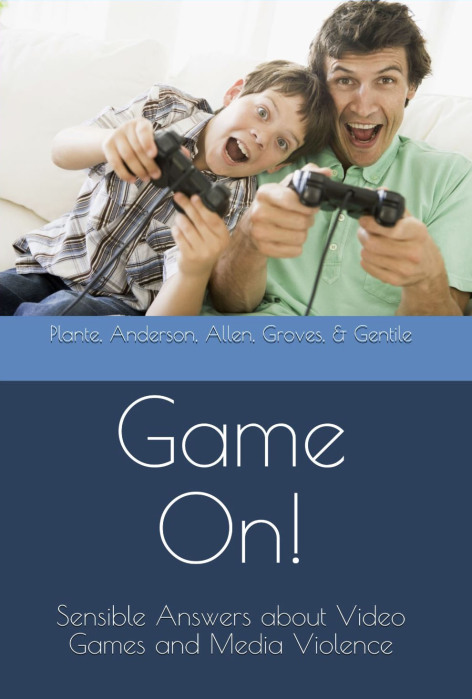AMES, Iowa – Making sense of all the research and debate over media’s risks and benefits can be time-consuming and overwhelming for many parents trying to decide what’s best for their child.
The authors of a new book, “Game On! Sensible Answers about Video Games and Media Violence,” know this from their own experience as parents, but also from the many questions they get as researchers in the field of media violence. That’s why they decided to write a book – which reads more like a dictionary or reference guide – to present the research in a way that helps parents make informed decisions. The authors say the Q&A format is well-suited for anyone who wants clear answers and guidance.
Craig Anderson, one of the authors and a Distinguished Professor of psychology at Iowa State University, says it is really two books in one. Although the primary audience is parents, it also works as a textbook or resource for high school and college students researching media violence and the various positive and negative effects that various types of video games have on players.
“We provide a short and a long answer to nearly 60 different questions that we often get from parents,” Anderson said. “The digital version includes hundreds of links, so you can read from beginning to end or branch off in any direction that fits your interest. The print version similarly works well for readers who prefer a hard copy on which they can take notes and dog-ear especially useful pages.”
Anderson and Douglas Gentile, an Iowa State professor of psychology, have a combined 50 years of research on media, media violence, aggression and video games. The two wrote the book with former post-doctoral student Courtney Plante, assistant professor at Bishop’s University; former Ph.D. student Christopher Groves, assistant professor at the University of Wisconsin Oshkosh; and current Ph.D. student Johnie Allen.
Separating fact from fiction
The amount of misinformation about media violence and video games was another motivation to write the book. The content is based on the authors’ research as well as hundreds of studies from scientists worldwide, to help readers separate fact from fiction. Gentile says decades of research have consistently shown that violent media is one risk factor for aggression.
However, it is important for parents and the public to understand that a single risk factor is rarely the sole cause of extreme violence. This is often debated when there is a mass shooting, and Gentile says news coverage tends to make the issue more confusing. The book explains that while media violence increases the risk for aggression and violent behavior, it is only one of many risk factors.
“Humans are not simple machines, and media stories are complex. It is not as simple as getting out what you put in,” Gentile said. “This book helps to clarify the complexities of how, why, who and when the media can influence our thoughts, feelings and behaviors.”
Much of the book focuses on violent video game effects on aggression and how to reduce those effects, but it also covers some of the positive effects of video games, as well as video game addiction and emerging links to attention deficit and impulsivity problems.
You can find more information about the book and details on how to purchase it here. The researchers say they wanted to make the book affordable and easily accessible, which is why they decided to publish the book independently.


